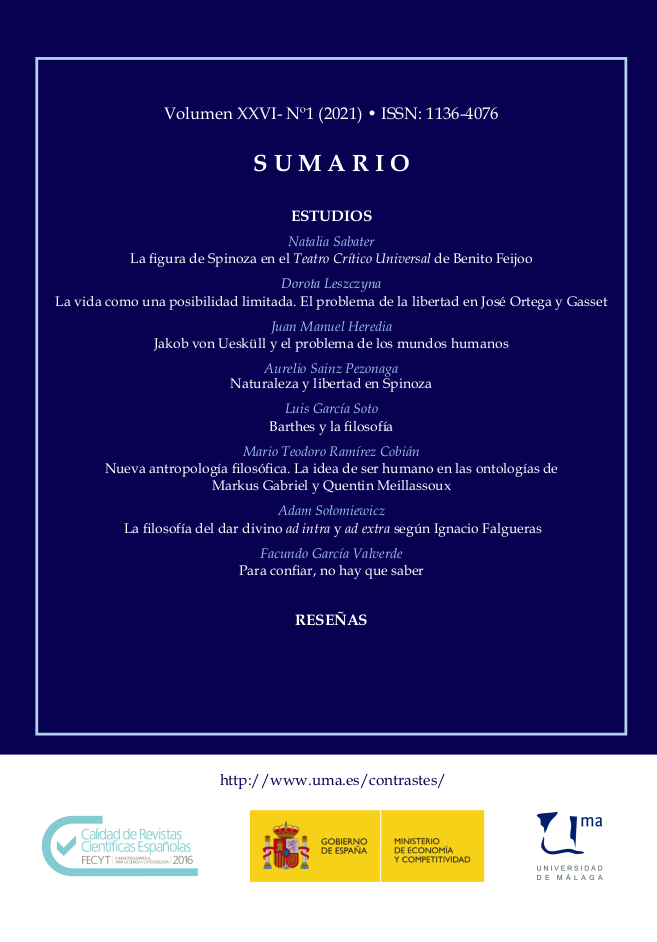Para confiar, no hay que saber
DOI:
https://doi.org/10.24310/Contrastescontrastes.v26i1.8805Resumen
Una característica indiscutible de la amistad es la confianza: los amigos confían entre sí contándose secretos y ayudándose especialmente cuando existen riesgos de que algo vaya mal.
Este artículo investiga la naturaleza de esa confianza. Aquí se mostrará que, en relaciones espesas de amistad y familia, la confianza no es un juicio sobre los riesgos de interactuar con otro sino una forma emotivamente cargada de considerar a los otros. Para mostrarlo, se ofrecerán tres razones obtenidas del análisis de la fenomenología de la traición, es decir, cuando la confianza ha sido destruida.
Descargas
Métricas
Publicación Facts
Perfil de revisores N/D
Información adicional autores
Indexado: {$indexList}
-
Indexado en
- Sociedad Académica/Grupo
- N/D
- Editora:
- Universidad de Málaga
Citas
Baier, A. (1995). Moral Prejudices. Essays on Ethics. Harvard: Harvard University Press.
Baier, A. (1986). Trust and Antitrust. Ethics , 96 (2), 231–260.
Bernstein, J. M. (2011). Trust: On the real but almost always unnoticed, ever-chanigng foundation of ethical life. Metaphilosophy , 42 (4), 395-416.
Cogley, Z. (2012). Trust and the Trickster Problem. Analytic Philosophy , 33 (1), 30-47.
Faulkner, P. (2007). On telling and trusting. Mind , 116 (464), 875-902.
Hardin, R. (2002). Trust & Trustworthiness. New York: Russell Sage Foundation.
Hieronymi, P. (2008). The reasons of trust. Australasian Journal of Philosophy , 86 (2), 213-236.
Holton, R. (1994). Deciding to Trust, Coming to Believe. Australasian Journal of Philosophy 72 (1994), pp.63-76 , 72 (1), 63-76.
Horsburgh, J. H. (1960). The Ethics of Trust. The Philosophical Quarterly , 10 (41), 343–354.
Jones, K. (2017). But I Was Counting on You. En P. Faulkner, & T. Simpson (Edits.), The Philosophy of Trust (págs. 90-108). Oxford: Oxford University Press.
Jones, K. (1996). Trust as an Affective Attitude. Ethics , 107 (1), 4-25.
Jones, K. (2019). Trust, distrust, and affective looping. Philosophical Studies , 176 (4), 955–968 .
Keren, A. (2014). Trust and belief: a preemptive reasons account. Synthese , 191 (12), 2593-2615.
Margalit, A. (2017). On Betrayal. Cambridge: Harvard University Press.
Pettit, P. (1995). The Cunning of Trust. Philosophy and Public Affairs , 24 (3), 202-225.
Ratcliffe, M., Ruddell, M., & Smith, B. (2014). What is a "sense of foreshortened future?" A phenomenological study of trauma, trust and time. Frontiers in Psychgology , 5, 1026-1036.
Wanderer, J., & Townsend, L. (2013). Is it Rational to Trust? Philosophy Compass , 8 (1), 1-14.
Descargas
Publicado
Cómo citar
Número
Sección
Licencia
Esta revista provee acceso libre inmediato a su contenido bajo el principio de hacer disponible gratuitamente la investigación al público. Todos los contenidos publicados en Contrastes. Revista internacional de Filosofía, están sujetos a la licencia Creative Commons Reconocimento-NoComercia-Compartirigual 4.0 cuyo texto completo puede consultar en <http://creativecommons.org/licenses/by-nc-sa/4.0>
Es responsabilidad de los autores/as obtener los permisos necesarios de las imágenes que están sujetas a derechos de autor.
Los autores/as cuyas contribuciones sean aceptadas para su publicación en esta revista conservarán el derecho no exclusivo de utilizar sus
contribuciones con fines académicos, de investigación y educativos,
incluyendo el auto-archivo o depósito en repositorios de acceso abierto de cualquier tipo.
La edición electrónica de esta revista esta editada por la Editorial de la
Universidad de Málaga (UmaEditorial), siendo necesario citar la procedencia en cualquier reproducción parcial o total.










5.png)
